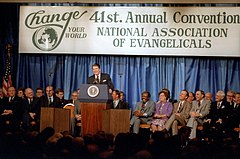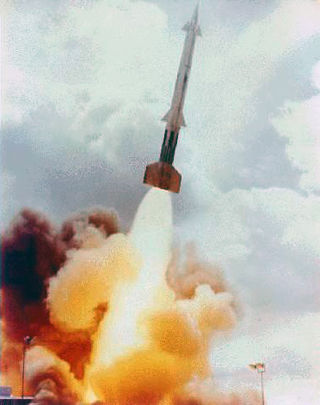
The Anti-Ballistic Missile Treaty, also known as the ABM Treaty or ABMT, was an arms control treaty between the United States and the Soviet Union on the limitation of the anti-ballistic missile (ABM) systems used in defending areas against ballistic missile-delivered nuclear weapons. It was intended to reduce pressures to build more nuclear weapons to maintain deterrence. Under the terms of the treaty, each party was limited to two ABM complexes, each of which was to be limited to 100 anti-ballistic missiles.

The history of the Soviet Union from 1982 through 1991 spans the period from the Soviet leader Leonid Brezhnev's death until the dissolution of the Soviet Union. Due to the years of Soviet military buildup at the expense of domestic development, and complex systemic problems in the command economy, Soviet output stagnated. Failed attempts at reform, a standstill economy, and the success of the proxies of the United States against the Soviet Union's forces in the war in Afghanistan led to a general feeling of discontent, especially in the Soviet-occupied Baltic countries and Eastern Europe.
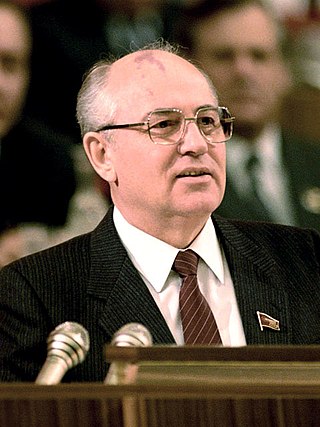
Mikhail Sergeyevich Gorbachev was a Soviet and Russian politician who served as the last leader of the Soviet Union from 1985 to the country's dissolution in 1991. He served as General Secretary of the Communist Party of the Soviet Union from 1985 and additionally as head of state beginning in 1988, as Chairman of the Presidium of the Supreme Soviet from 1988 to 1989, Chairman of the Supreme Soviet from 1989 to 1990 and the only President of the Soviet Union from 1990 to 1991. Ideologically, Gorbachev initially adhered to Marxism–Leninism but moved towards social democracy by the early 1990s.
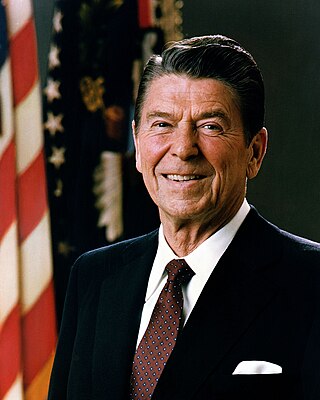
Ronald Wilson Reagan was an American politician and actor who served as the 40th president of the United States from 1981 to 1989. A member of the Republican Party, his presidency constituted the Reagan era, and he is considered one of the most prominent conservative figures in American history.

The Cold War was a period of geopolitical tension between the United States and the Soviet Union and their respective allies, the Western Bloc and the Eastern Bloc, that started in 1947 and lasted to 1991.
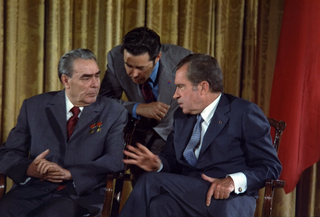
Détente is the relaxation of strained relations, especially political ones, through verbal communication. The diplomacy term originates from around 1912, when France and Germany tried unsuccessfully to reduce tensions.

The Intermediate-Range Nuclear Forces Treaty was an arms control treaty between the United States and the Soviet Union. US President Ronald Reagan and Soviet General Secretary Mikhail Gorbachev signed the treaty on 8 December 1987. The US Senate approved the treaty on 27 May 1988, and Reagan and Gorbachev ratified it on 1 June 1988.

The Berlin Wall Speech was delivered by United States President Ronald Reagan in West Berlin on June 12, 1987. The speech is commonly known by a key line from the middle part: "Mr. Gorbachev, tear down this wall!" Reagan called for the General Secretary of the Communist Party of the Soviet Union, Mikhail Gorbachev, to open the Berlin Wall, which had encircled West Berlin since 1961.

Ronald Reagan's tenure as the 40th president of the United States began with his first inauguration on January 20, 1981, and ended on January 20, 1989. Reagan, a Republican from California, took office following his landslide victory over Democrat incumbent president Jimmy Carter and independent congressman John B. Anderson in the 1980 presidential election. Four years later, in the 1984 presidential election, he defeated former Democratic vice president Walter Mondale, to win re-election in a larger landslide. Due to U.S. Constitutional law, Reagan was limited to two terms and was succeeded by his vice president, George H. W. Bush, who won the 1988 presidential election. Reagan's 1980 landslide election resulted from a dramatic conservative shift to the right in American politics, including a loss of confidence in liberal, New Deal, and Great Society programs and priorities that had dominated the national agenda since the 1930s.
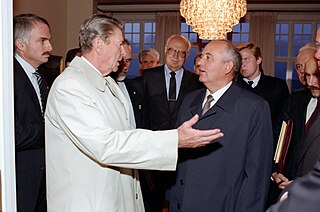
The Reykjavík Summit was a summit meeting between U.S. President Ronald Reagan and General Secretary of the Communist Party of the Soviet Union Mikhail Gorbachev, held in Reykjavík, Iceland, on 11–12 October 1986. The talks collapsed at the last minute, but the progress that had been achieved eventually resulted in the 1987 Intermediate-Range Nuclear Forces Treaty between the United States and the Soviet Union.

The Cold War from 1979 to 1985 was a late phase of the Cold War marked by a sharp increase in hostility between the Soviet Union and the West. It arose from a strong denunciation of the Soviet invasion of Afghanistan in December 1979. With the election of Prime Minister Margaret Thatcher in 1979, and American President Ronald Reagan in 1980, a corresponding change in Western foreign policy approach toward the Soviet Union was marked by the rejection of détente in favor of the Reagan Doctrine policy of rollback, with the stated goal of dissolving Soviet influence in Soviet Bloc countries. During this time, the threat of nuclear war had reached new heights not seen since the Cuban Missile Crisis of 1962.

The time period of around 1985–1991 marked the final period of the Cold War. It was characterized by systemic reform within the Soviet Union, the easing of geopolitical tensions between the Soviet-led bloc and the United States-led bloc, the collapse of the Soviet Union's influence in Eastern Europe, and the dissolution of the Soviet Union in 1991.
American foreign policy during the presidency of Ronald Reagan (1981–1989) focused heavily on the Cold War which was rapidly intensifying. The US government pursued a policy of containment and rollback with regards to communist regimes. The Reagan Doctrine operationalized these goals as the United States offered financial, logistical, training, and military equipment to anti-communist opposition in Afghanistan, Angola, and Nicaragua. He expanded support to anti-communist movements in Central and Eastern Europe.

Jack Foust Matlock Jr. is an American former ambassador, career Foreign Service Officer, teacher, historian, and linguist. He was a specialist in Soviet affairs during some of the most tumultuous years of the Cold War, and served as the U.S. Ambassador to the Soviet Union from 1987 to 1991.
Trust, but verify is a Russian proverb, which is rhyming in Russian. The phrase became internationally known in English after Suzanne Massie, a scholar of Russian history, taught it to Ronald Reagan, then president of the United States, the latter of whom used it on several occasions in the context of nuclear disarmament discussions with the Soviet Union.
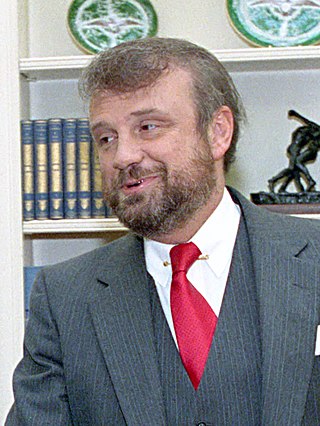
Anthony R. Dolan is a Pulitzer Prize-winning journalist and was a speechwriter for President Ronald Reagan from March 1981 until the end of Reagan's second term in 1989. Dolan served as the Director of Special Research and Issues and in the Office of Research and Policy at the Headquarters of the Reagan-Bush Committee. Under the name Tony Dolan he had been, for a time, a conservative folk-singer who put out the album "Cry, The Beloved Country" and appeared on The Merv Griffin Show.
Ronald Reagan was the 40th president of the United States from 1981 to 1989. Previously, he was the 33rd governor of California from 1967 to 1975 and acted in Hollywood films from 1937 to 1964, the same year he energized the American conservative movement. Reagan's basic foreign policy was to equal and surpass the Soviet Union in military strength, and put it on the road to what he called "the ash heap of history". By 1985, he began to cooperate closely with Soviet leader Mikhail Gorbachev, whom he became friends and negotiated large-scale disarmament projects with. The Cold War was fading away and suddenly ended as the Soviets lost control of Eastern Europe almost overnight in October 1989, nine months after Reagan was replaced in the White House by his vice president, George H. W. Bush, who was following Reagan's policies. The dissolution of the Soviet Union took place in December 1991. In terms of the Reagan Doctrine, he promoted military, financial, and diplomatic support for anti-communist insurgencies in Afghanistan, Nicaragua, and numerous other countries. For the most part, local communist power collapsed when the Soviet Union collapsed.
The "Zero Option" was the name given to an American proposal for the withdrawal of all Soviet and United States intermediate-range nuclear missiles from Europe. This term was subsequently expanded to describe the vision of eliminating all nuclear weapons everywhere.
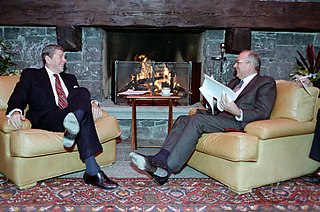
The Geneva Summit of 1985 was a Cold War-era meeting in Geneva, Switzerland. It was held on November 19 and 20, 1985, between U.S. President Ronald Reagan and Soviet General Secretary Mikhail Gorbachev. The two leaders met for the first time to hold talks on international diplomatic relations and the arms race.

The Helsinki Summit was a private, bilateral meeting between American President George H. W. Bush and Soviet President Mikhail Gorbachev that took place in Helsinki, Finland on September 9, 1990. Due to the vested interests of both the Soviet Union and the United States in the Gulf Crisis' resolution, August 1990 Iraqi invasion of Kuwait was the primary topic of discussion for the leaders during the Helsinki Summit. The concerted efforts at easing American-Soviet tensions in the aftermath of the Cold War was another prominent topic, among other notable current events. At the summit's conclusion, Presidents Bush and Gorbachev produced a document of joint statements that illuminated the areas in which the leaders had committed to aligning their foreign policy goals. The summit was followed by a press conference wherein members of the media questioned Presidents Bush and Gorbachev about the content of their meeting and the justifications for their joint statements.
